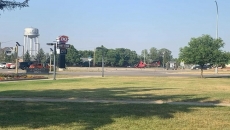Ongoing complaints about roadblocks in Kabul and bureaucratic hurdles in Ottawa tempered any sense of relief on Thursday after Prime Minister Justin Trudeau revealed on the campaign trail that the Canadian military has arrived back in Afghanistan to help with evacuation efforts.
The Department of National Defence Canada announced this week that two C-17 transport aircraft had been deployed to conduct regular flights out of Kabul, and Trudeau revealed while campaigning as Liberal party leader in Victoria that the first troops are now on the ground.
"Canada has personnel on the ground now and we'll have more personnel arriving later today to help with the processing," he said, adding the images out of Kabul have been heartbreaking and that government remains committed to helping hundreds of Afghans who helped Canada.
Those Afghans include former interpreters and support staff as well as their families who are now at risk of Taliban arrest or worse for having worked with the Canadian military and other organizations after the militant group took over the country.
The arrival of Canadian military personnel suggests efforts to evacuate such people could be ramping up following weeks of stinging criticism from veterans and advocacy groups who have accused the government of acting too slowly and leaving people who helped Canada to die.
Yet questions and concerns remained about exactly how interpreters and their families would make it to those Canadian military planes — and what would happen if they were fortunate enough to actually get on board.
One interpreter who spoke to The Canadian Press on Thursday shared videos of the scene outside the airport, where crowds of Afghans had gathered in the hopes of finding an avenue to escape the country. The videos show U.S. soldiers firing into the air to keep the crowd at bay.
The interpreter, whose identity is being shielded to protect his safety, says he worked with the Canadian military in Panjwaii district from 2010-2013 and is now hiding from the Taliban in Kabul with his three young children and wife.
“It is very scary for the last five days because everybody's very scared,” he said. “Everybody's afraid of the Taliban.”
Retired major-general Denis Thompson, one of numerous Canadian veterans working to help former Afghan colleagues and their families, says Taliban checkpoints represent the main challenge in getting people to the airport and away to safety.
“How do you get people out of their safe houses, through the Taliban checkpoints and onto the airfield in a safe manner and in a manner where they're not delayed so long that they actually missed a flight,” Thompson said in an interview.
American officials have said they are in talks with the Taliban amid reports some insurgent fighters have been turning back or detaining people who are trying to get out of the country while others have let asylum seekers through without hindrance.
“Unless the Taliban shift their posture significantly, which is something the international community and Canada are working on, it is going to be very, very difficult to get many people out,” Trudeau said.
Pentagon spokesman John Kirby said U.S. forces on the ground at Kabul airport are helping allied countries get their nationals out of Afghanistan.
“We obviously are … willing to support the movement, safe movement of citizens of our allies and partners,” he told a briefing Thursday.
Getting to the airport is only one challenge. Stephen Watt, whose organization Northern Lights Canada has been working with hundreds of former interpreters, says the next obstacle is getting past the U.S. military checkpoints and onto a plane.
Watt and others have complained for weeks about IRCC’s handling of the crisis. That includes complicated forms for Afghans to fill out, unrealistic and confusing application requirements and complete silence from the department after paperwork has been submitted.
The interpreter who spoke to The Canadian Press said he submitted his paperwork weeks ago with help from Northern Lights Canada and the Afghan-Canadian Interpreters group but has yet to receive confirmation that it was received, let alone that he and his family have been approved.
Veterans and advocates have echoed those same stories, with scared Afghans checking their phones dozens of times per day to see if there is an email from IRCC or waiting for that life-saving phone call telling them a plane is on its way and that they need to get to the airport.
Without such confirmations, Watt said most interpreters and their families won’t be able to get past the U.S. checkpoints and onto a plane.
“One of the things that you do need to get through the blockade is a G-number, which is Canada's tracking number to show that you are in the system,” he said.
“And because of this whole shambolic situation where Canada is not responding to emails and not processing people, a large majority of people we're talking to do not have G-numbers. So how are they going to go through the airport?”
Watt said some did receive a message on Thursday, but it was from the Canadian Embassy in Lebanon saying they are now required to get a medical test. Other former interpreters reported needing a negative COVID-19 test before they could board a flight.
While Trudeau was unaware of the COVID-19 test requirement, Immigration Minister Marco Mendicino’s office later said it has been lifted.
Watt said such messages underscore the confusion and frustration that have marked Canada’s evacuation efforts to date.
Veterans have been working with the Canadian military on a consolidated list of verified interpreters, and Thompson suggests the government needs to get those people and their families on a plane to a third country like Kuwait now where their paperwork can be processed.
Yet immigration officials have so far refused to take the list.
In the meantime, as night fell in Kabul, the interpreter who spoke to The Canadian Press said he was praying to receive a message confirming his family’s ability to escape in the morning, at which point they would risk the Taliban checkpoints and hopefully leave the country.
“Tomorrow morning, hopefully I will get an actual response, an actual email,” he said. “Then I will go.”






